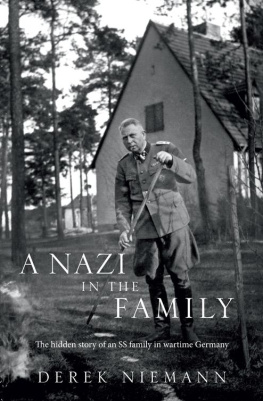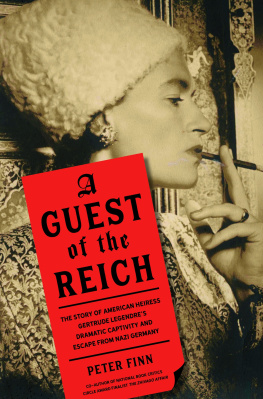The world may very likely not always think of them as they think of themselves, but what care they for the world?
Grimms Fairy Tales
At St. Luisas Home for Girls in western Berlin, birthdays were observed, not celebrated. Bernis eighth, which fell in the winter of 1923, came and went with neither singing nor candles on a wooden Geburtstagskranz. Instead, the nuns burned money.
They treat us like livestock, Berni hissed into her little sisters good ear that morning at breakfast. They were eating dry slices of Vollkornbrot with nothing to improve its taste: no meat, no butter, no jam. Kannst du mich hren? This was Gretes least favorite question, but Berni could never help asking.
Grete, who was five, tugged a lock of blond hair over her left ear. It was smooth and pink as a shell, with fewer grooves in it than in other ears. I can hear you, she muttered with a glance at the sisters table. You neednt speak so loudly.
Berni took a bite of bread and wrinkled her nose, tasting a distinctive tinge of fish. On Friday mornings, the stink of pickled herring seeped into everything in the refectory: the girls hair, their bread, their thin gray dirndls. Having served breakfast, the cook and her staff peeled open tins of Voelkers fillets to prepare a meatless dinner of herring salad. The one aroma that could cut through the fishy air was the comforting smoke from burning pine logs. But that winter the stack of firewood in the circular rack had dwindled.
If we had parents, Berni said, mouth full, wed be eating jam, cookies, tea
Hush, whispered Konstanz, who sat on Bernis left. I have a father, and he always said children need nothing more than potatoes to survive.
I am sure he didnt serve you frozen milk. Berni tilted her cup and glared at the sisters, who ate knackwurst and drank coffee at an elevated table, their faces hidden by the lily petals of their cornettes. They didnt seem even to notice that today, for the first time, there was no fire at all. For firewood you needed money, and the sisters money, it seemed, was no longer any good.
Each Friday the firewood man arrived just after morning prayers, when the girls had their hands folded in their laps, their eyes active. Sister Maria Eberhardt, the reverend mother, waited for him beside the back door of the refectory with an envelope of cash.
Over the course of the winter, the envelope had grown larger and larger. On the first of the new year, Sister Maria paid him with a box full of money. Then a basket. Berni had heard the term inflation, but she didnt understand what it meant or why it happened. She didnt yet know that panic and hysteria were driving Berliners to vice, to risk. Her world was still small; what she knew was the slap of a bleach-dipped rag against the bathroom floor, the chill of chapel marble under her knees. From history class, she knew there had been a Kaiser and now a democracy, but as a Catholica minority in Berlinshe should not forget the pope sat above everyone else.
She had asked Sister Josephine, her favorite, about inflation one afternoon after mathematics. Oh, child. Sister Josephine spun Berni around, pulling her braids into long, dark ribbons of hair. We have been trying to repay England and France since the end of the war.
Then why does there seem to be more money floating around, piles and piles of it?
Because theres a man in an office cranking a printing press, trying to make enough to repay the Frogs. You must quit this nasty habit of chewing the ends of your plaits, Bernadette. You look like a wild orphan.
If anyone else had said this, Berni would have balked. The word orphan was taboo among the girls. They were daughters of St. Luisa. They were Lulus.
Konstanz gave Berni a jab, and Berni looked down to see a yellow cardboard cone in her lap. Both of them watched the sisters eat as Konstanz passed it to Berni under the table.
The cone was a Schultte, the gift parents gave their children on the first day of school. As Bernis greedy fingers dug inside, her eyes drifted over the long tables and benches, settling on Hannelore Haas, an eight-year-old whod arrived the day before. Her eyes were swollen from crying. As had been happening to families more and more frequently, Hannelores parents had been unable to support all their children, and so they left their eldest here. Giving her the cone was almost cruel, Berni thought; it suggested this place was just like any other school, though as soon as Hannelore saw it she must have recognized it for what it was.
Of course, the other girls had immediately seized Hannelores parents parting gift. Nobody was allowed to think she was special just because her parents were alive. Emboldened by Sister Marias absence from breakfast, theyd been passing it from table to table. By the time it reached Berni, the toys and school supplies and most of the wrapped candies were gone. She dug out a chocolate-covered nut, then glanced once more toward the sisters before popping it into her mouth. When she looked up, Hannelores glazed eyes were fixed on her.
Dont, Grete murmured, but Berni bit into the chocolate, and her eyelids fell shut. The flavor, a bit bitter, stung the sides of her mouth and set her molars buzzing. The nut crunched into a sweet, oily paste. She could see the flavors, somehow, painted on her closed lids: magenta and yellow and aquamarine. When she opened her eyes to the whitewashed brick walls, the bare bulbs dangling from the ceiling, the gray of the girls uniforms and black cluster of nuns, she almost couldnt believe this dull vision was the real world.
Try one. She pressed the cone toward Grete. They arent paying attention, she added with a nod toward the sisters table.
Grete shook her head, her blue eyes wide with fear.
You have to. The chocolate, itsits a carnival. Its May Day and Christmas together.
Again Grete refused, and Berni pinched her lightly on the arm. If they were caught with Hannelores Schultte, they both knew Berni would be in trouble, not Grete. The sisters scarcely noticed Grete. Sometimes it seemed even to Berni that her sister had been crafted from less substantial stuff than she was, that Gods brush had a little less paint on it when he made Grete, his clay mixed with a little more water. She was pale and petite, with weak hearing; there was nothing weak about Berni. The sisters said she must have had a bit of gypsy in her, with her dark coloring, her big feet and hands, her restless energy. All the proof Berni and Grete had that they were related were the shallow clefts in their chins, and their name. They were called Metzger, not Kirchhof or Ostertag, names the sisters gave to foundlings. Later, Berni promised, when they left St. Luisas, they would find other Metzgers. It would mean something.
Fine, Berni whispered when Grete refused again. More for me. The girls on the other side of Grete groaned.
Ruhe bitte! The refectory door swung wide, slamming the opposite wall.
Chairs shifted and spines straightened. Berni pressed the cone against her leg, willing it to disappear.
The reverend mother stood in the doorway with a wheelbarrow. A woman thick of neck and skull, Sister Maria taught six years of Latin to every child who came through St. Luisas. As she passed, Berni strained to peek inside her wheelbarrow and saw that it was stuffed with crisp new money. Sister Odi leapt from her table to waddle behind Sister Maria, picking up bills that had fluttered to the floor. When Sister Maria reached the back door, she stood and put her hands to the base of her long spine, straightening it in a series of cracks. Berni waited, holding her breath, for the firewood man to knock on the door. It did not take long.






